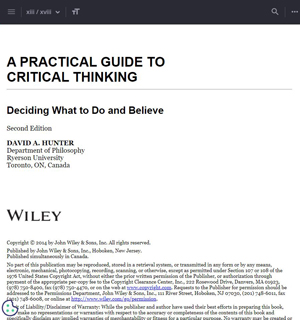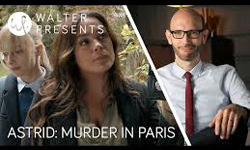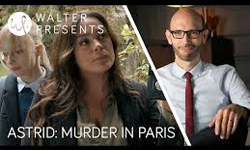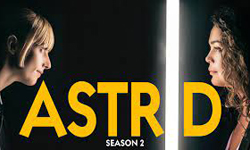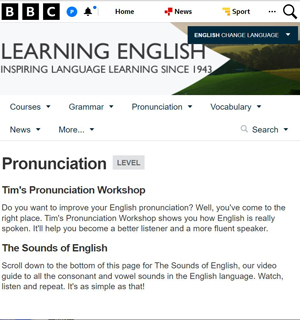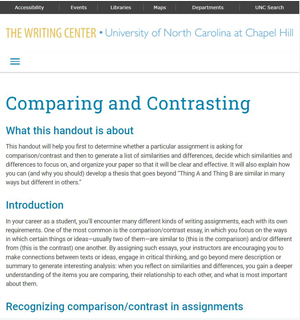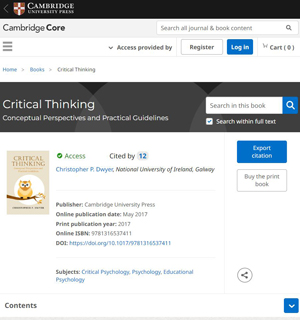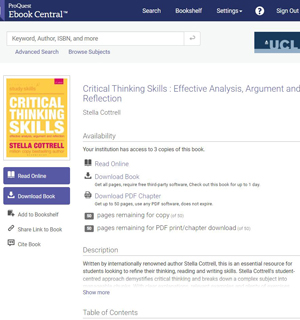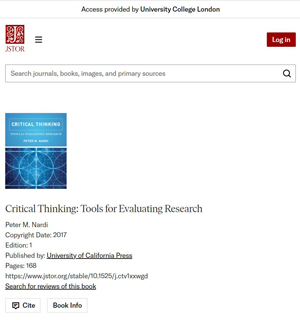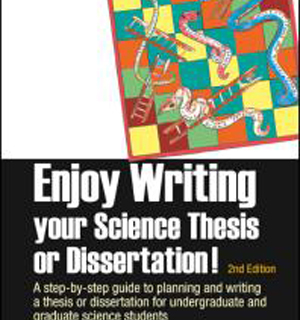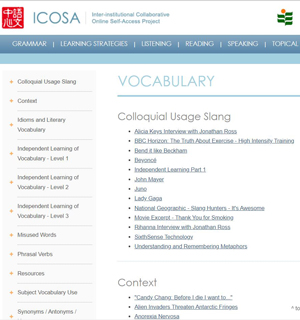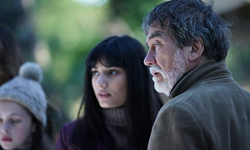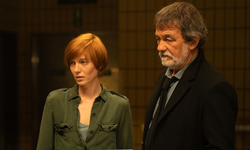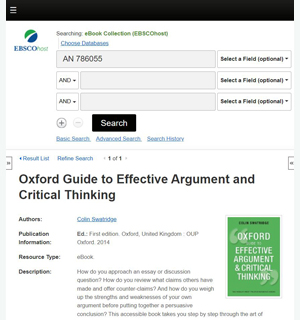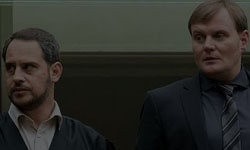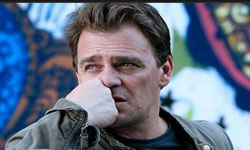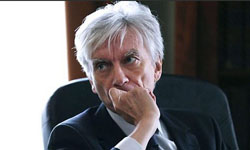Select one or more of these popular tags:
-
A Practical Guide to Critical Thinking
-
A book on critical thinking with a particularly useful and brief appendix on CT mistakes and Strategies. Requires library login.
A book on critical thinking with a particularly useful and brief appendix on CT mistakes and Strategies. Requires library login.
-
Astrid: Murder in Paris - Series 1 Episode 5
-
Laurent Burtin, Alexandre de Seguins , , 2019
A best-selling novelist is found dead in his apartment behind double locked doors. Raphaelle's boss thinks it an open and shut case of death by suicide. Could there be any other explanation?
- 1.0
- English subtitles
- 53
A best-selling novelist is found dead in his apartment behind double locked doors. Raphaelle's boss thinks it an open and shut case of death by suicide. Could there be any other explanation?
-
Astrid: Murder in Paris - Series 1 Episode 8
-
Laurent Burtin, Alexandre de Seguins , , 2019
Astrid and Raphaelle accompany Astrid's friend William to his brother's funeral. But before the service can start, the body vanishes...
- 1.0
- English subtitles
- 56
Astrid and Raphaelle accompany Astrid's friend William to his brother's funeral. But before the service can start, the body vanishes...
-
Astrid: Murder in Paris - Series 2 - Episode 5
-
Alexandre de Seguins, Laurent Burtin , , 2022
A young mother who has just given birth is found dead. Her baby has disappeared and strange rituals visible at the crime scene direct the duo to witchcraft practices.
- 1.0
- English subtitles
- 52
A young mother who has just given birth is found dead. Her baby has disappeared and strange rituals visible at the crime scene direct the duo to witchcraft practices.
-
BBC Learning English - Pronunciation
-
Videos on how to pronounce the basic sounds of British English as well as other features such as assimilation and linking
Videos on how to pronounce the basic sounds of British English as well as other features such as assimilation and linking
-
Comparing and Contrasting
-
"This [webpage] will help you first to determine whether a particular assignment is asking for comparison/contrast and then to generate a list of similarities and differences, decide which similarities and differences to focus on, and organize your paper so that it will be clear and effective. It will also explain how you can (and why you should) develop a thesis that goes beyond “Thing A and Thing B are similar in many ways but different in others.â€"
"This [webpage] will help you first to determine whether a particular assignment is asking for comparison/contrast and then to generate a list of similarities and differences, decide which similarities and differences to focus on, and organize your paper so that it will be clear and effective. It will also explain how you can (and why you should) develop a thesis that goes beyond “Thing A and Thing B are similar in many ways but different in others.â€"
-
Critical Essay Writing
-
A guide to critical essay writing with videos and links to other sources.
A guide to critical essay writing with videos and links to other sources.
-
Critical Thinking - Conceptual Perspectives and Practical Guidelines
-
A book covering the skills of critical thinking and research on teaching and assessing CT.
A book covering the skills of critical thinking and research on teaching and assessing CT.
-
Critical Thinking Skills : Effective Analysis, Argument and Reflection
-
The seminal student-focused book on critical thinking. Requires library login.
The seminal student-focused book on critical thinking. Requires library login.
-
Critical Thinking: Tools for Evaluating Research
-
A book on critical thinking suitable for undergrads and postgrads. Library login needed
A book on critical thinking suitable for undergrads and postgrads. Library login needed
-
Die andere Heimat - Chronik einer Sehnsucht : Part 2
-
Edgar Reitz , , 2013
As he studies the languages of tribal South America, the return from military service of his more worldly brother Gustav fails to break him from his daydream, but day-to-day living in Prussian feudal society means that his dreams have to be put on hold.
- 1.0
- English subtitles
- 122
As he studies the languages of tribal South America, the return from military service of his more worldly brother Gustav fails to break him from his daydream, but day-to-day living in Prussian feudal society means that his dreams have to be put on hold.
-
Enjoy Writing Your Science Thesis Or Dissertation! : A Step-by-step Guide To Planning And Writing A Thesis Or Dissertation For Undergraduate And Graduate Science Students (2nd Edition)
-
This book is a step by step illustrated guide to planning and writing dissertations and theses for undergraduate and graduate science students. Topics covered include advice on writing each section of a thesis as well as general discussions on collecting and organizing references, keeping records, presenting data, interacting with a supervisor and avoiding academic misconduct. Recommendations about how to use word processors and other software packages effectively are included, as well as advice on the use of other resources. A concise summary of important points of English grammar is given, along with appendices listing frequently confused words and wordy phrases to avoid. Further appendices are provided, including one on SI units. The aim is to provide an easy-to-read guide that gives students practical advice about all aspects of writing a science thesis or dissertation, starting from writing a thesis plan and finishing with the viva and corrections to the thesis.
This book is a step by step illustrated guide to planning and writing dissertations and theses for undergraduate and graduate science students. Topics covered include advice on writing each section of a thesis as well as general discussions on collecting and organizing references, keeping records, presenting data, interacting with a supervisor and avoiding academic misconduct. Recommendations about how to use word processors and other software packages effectively are included, as well as advice on the use of other resources. A concise summary of important points of English grammar is given, along with appendices listing frequently confused words and wordy phrases to avoid. Further appendices are provided, including one on SI units. The aim is to provide an easy-to-read guide that gives students practical advice about all aspects of writing a science thesis or dissertation, starting from writing a thesis plan and finishing with the viva and corrections to the thesis.
-
HelloTalk
-
A language exchange app where you can talk to native speakers of other languages. You need to pay for some features.
A language exchange app where you can talk to native speakers of other languages. You need to pay for some features.
-
Inter-Institutional Collaborative Online Self-Access Project
-
A large list of videos with exercises and other activities to help you expand your vocabulary and develop your skills.
A large list of videos with exercises and other activities to help you expand your vocabulary and develop your skills.
-
Jugée Coupable (Presumed Guilty) Series 1 - Episode 1
-
Grégory Écale , , 2021
French thriller from Walter Presents. Trapped in a small town, Lola Brémond needs to know three things: who killed her mother, who her father is, and who she can trust to help her find out. All Episode streaming at: https://www.channel4.com/programmes/presumed-guilty
- 1.0
- English subtitles
- 49
French thriller from Walter Presents. Trapped in a small town, Lola Brémond needs to know three things: who killed her mother, who her father is, and who she can trust to help her find out. All Episode streaming at: https://www.channel4.com/programmes/presumed-guilty
-
La Promesse (The Promise) Series 1 - Episode 2
-
Gaëlle Bellan, Anne Landois , , 2020
Sarah visits the small town where she grew up and where Charlotte Meyer disappeared back in 1999, as she attempts to tie the Meyer case to another recent disappearance.
- 1.0
- English subtitles
- 54
Sarah visits the small town where she grew up and where Charlotte Meyer disappeared back in 1999, as she attempts to tie the Meyer case to another recent disappearance.
-
La Promesse (The Promise) Series 1 - Episode 5
-
Gaëlle Bellan, Anne Landois , , 2020
Following yet another infraction, Sarah is pulled off the case. Frozen out by her colleagues, she continues to investigate behind their backs. In French with English subtitles.
- 1.0
- English subtitles
- 54
Following yet another infraction, Sarah is pulled off the case. Frozen out by her colleagues, she continues to investigate behind their backs. In French with English subtitles.
-
Les Rivières Pourpres (The Crimson Rivers) - Series 3 - Episode 2 - Final Judgement Part 1
-
Jean-Christophe Grangé , , 2021
From a tough prison, convicted felon Marek calls Niemans to come and see him. Before Niemans can get there, Marek is seriously injured and another prisoner is dead. What is going on?
- 1.0
- English subtitles
- 46
From a tough prison, convicted felon Marek calls Niemans to come and see him. Before Niemans can get there, Marek is seriously injured and another prisoner is dead. What is going on?
-
Lingbe
-
A free language exchange app where you can talk to native speakers of other languages.
A free language exchange app where you can talk to native speakers of other languages.
-
Lingro
-
Makes every word on webpage clickable and linked to dictionary - enter the webpage you want to read in Box 1 and select whether you want English explanation or translation of the words into other languages.
Makes every word on webpage clickable and linked to dictionary - enter the webpage you want to read in Box 1 and select whether you want English explanation or translation of the words into other languages.
-
Mendeley
-
A reference manager supported by UCL Explore
A reference manager supported by UCL Explore
-
Microsoft Templates
-
A huge resource of free templates for Office software, some suitable for academic uses.
A huge resource of free templates for Office software, some suitable for academic uses.
-
New Academic Word List
-
A simple alphabetical list of all the words on the the Academic Word list with links to a few other useful vocabulary lists (scroll to the bottom).
A simple alphabetical list of all the words on the the Academic Word list with links to a few other useful vocabulary lists (scroll to the bottom).
-
Open University - Study Skills
-
A collection of advice on Study skills with links to other advice.
A collection of advice on Study skills with links to other advice.
-
Oxford Guide to Effective Argument and Critical Thinking
-
A book covering the basics of developing an argument. Requires library login.
A book covering the basics of developing an argument. Requires library login.
-
Paris Police 1905 - Episode 4
-
Julien Despaux , , 2022
Louise Lépine finds an unlikely ally in her attempts to persuade her father to postpone his retirement, Jouin and Cochefert hear testimony from the mother of Paul Cetinet, and Fiersi, now a free agent, talks to one of the maids at Château de Bagatelle.
- 1.0
- English subtitles
- 53
Louise Lépine finds an unlikely ally in her attempts to persuade her father to postpone his retirement, Jouin and Cochefert hear testimony from the mother of Paul Cetinet, and Fiersi, now a free agent, talks to one of the maids at Château de Bagatelle.
-
Schuld (Shades of Guilt) Season 1 - Episode 1 : The Other
-
Maris Pfeiffer Hannu Salonen , , 2015
A married couple dream of inviting a third party into their bedroom. But when fantasy becomes reality, what seemed like harmless fun soon spirals out of control as one encounter has dire consequences. Strong Language,Violence and scenes of a sexual nature. Not suitable for younger viewers.
- 1.0
- English subtitles
- 45
A married couple dream of inviting a third party into their bedroom. But when fantasy becomes reality, what seemed like harmless fun soon spirals out of control as one encounter has dire consequences. Strong Language,Violence and scenes of a sexual nature. Not suitable for younger viewers.
-
Schuld (Shades of Guilt) Season 1 - Episode 3 : Compensation
-
Maris Pfeiffer Hannu Salonen , , 2015
A wife and mother endures years of physical and sexual abuse inflicted by her husband, but when he threatens to raise the stakes further, she decides to fight back and soon finds herself in court. Strong Language,Violence and scenes of a sexual nature. Not suitable for younger viewers.
- 1.0
- English subtitles
- 45
A wife and mother endures years of physical and sexual abuse inflicted by her husband, but when he threatens to raise the stakes further, she decides to fight back and soon finds herself in court. Strong Language,Violence and scenes of a sexual nature. Not suitable for younger viewers.
-
Spiral Series 3: The Butcher of La Villette Episode 02
-
Alexandra Clert Guy-Patrick Sainderichin , , 2010
With a second girl reported missing, police take in another suspect. .
- 1.0
- English subtitles
- 55
With a second girl reported missing, police take in another suspect. .
-
Spiral Series 4
-
Jean-Marc Brondolo , , 2012
On learning of Cetin's release from police custody, the Ozbeks suspect him of informing against them and Rodi is ordered to eliminate him, but Rodi's associates have other ideas. Karlsson is called to the police station to answer a traffic offence, but is instead charged with perverting the course of justice.
- 1.0
- English subtitles
- 400
On learning of Cetin's release from police custody, the Ozbeks suspect him of informing against them and Rodi is ordered to eliminate him, but Rodi's associates have other ideas. Karlsson is called to the police station to answer a traffic offence, but is instead charged with perverting the course of justice.

